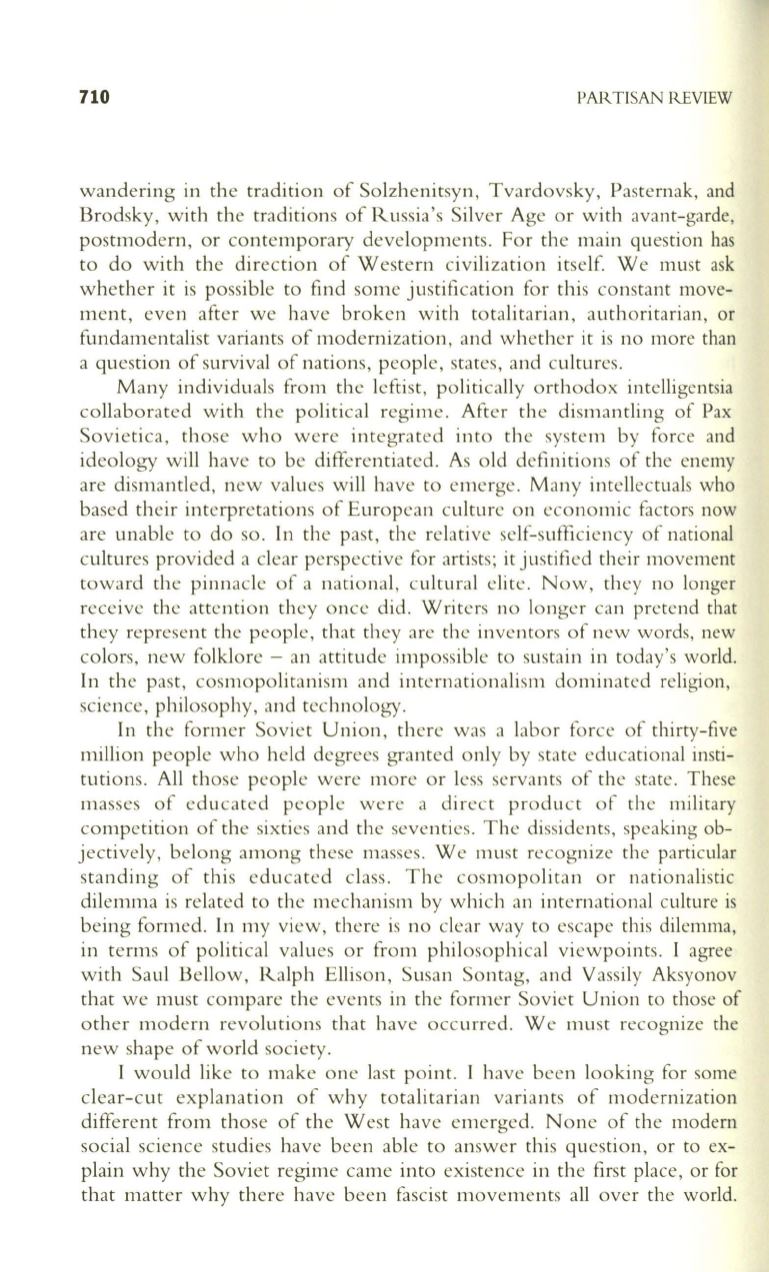
710
PAl~
TISAN REVIEW
wandering in the tradition of Solzhenitsyn, Tvardovsky, Pasternak, and
Brodsky, with the traditions of Russia's Silver Age or with avant-garde,
postmodern, or contemporary developments. For the main question has
to do with the direction of Western civilization itself. We must ask
whether it is possible to find some justification for this constant move–
ment, even after we have broken with totalitarian, authoritarian, or
fundamentalist variants of modernization, and whether it is no more than
a question of survival of nations, people, states, and cultures.
Many individuals from the leftist, politically orthodox intelligentsia
collaborated with the political regime. After the dismantling of Pax
Sovietica, those who were integrated into the system by force and
ideology will have to be differentiated. As old definitions of the enemy
are dismantled, new values will have
to
emerge. Many intellectuals who
based their interpretations of European culture on economic factors now
are unable to do so. In the past, the relative self-sufficiency of national
cultures provided a clear perspective for artists; it justified their movement
toward the pinnacle of a national, cultural elite. Now, they no longer
receive the attention they once did. Writers no longer can pretend that
they represent the people, that they are the inventors of new words, new
colors, new folklore - an attitude impossible to sustain in today's world.
In the past, cosmopolitanism and internationalism dominated religion,
science, philosophy, and technology.
In the former Soviet Union, there was a labor force of thirty-five
million people who held degrees granted only by state educational insti–
tutions. All those people were more or less servants of the state. These
masses of educated people were a direct product of the military
competition of the sixties and the seventies. The dissidents, speaking ob–
jectively, belong among these masses. We must recognize the particular
standing of this educated class. The cosmopolitan or nationalistic
dilemma is related to the mechanism by which an international culture is
being formed. In my view, there is no clear way
to
escape this dilemma,
in terms of political values or from philosophical viewpoints. I agree
with Saul Bellow, Ralph Ellison, Susan Sontag, and Vassily Aksyonov
that we must compare the events in the former Soviet Union to those of
other modern revolutions that have occurred. We must recognize the
new shape of world society.
I would like to make one last point. I have been looking for some
clear-cut explanation of why totalitarian variants of modernization
different from those of the West have emerged. None of the modern
social science studies have been able to answer this question, or to ex–
plain why the Soviet regime came into existence in the first place, or for
that matter why there have been fascist movements all over the world.


